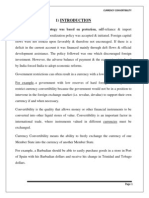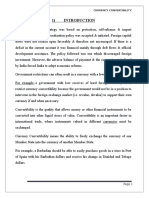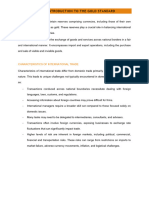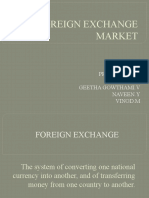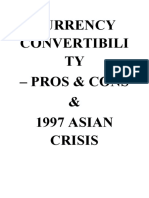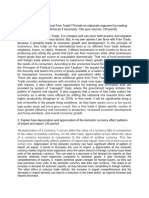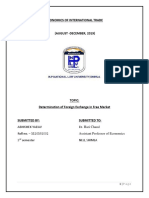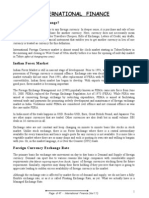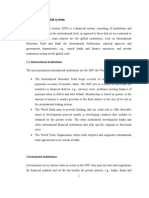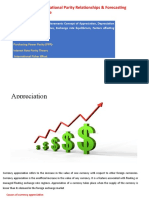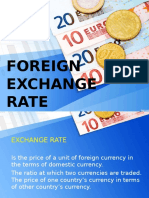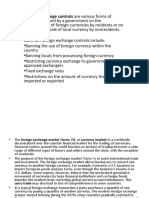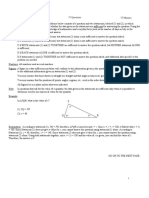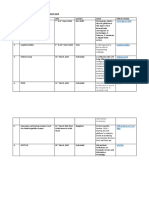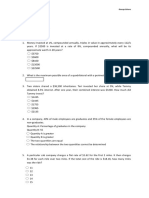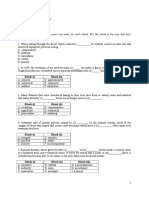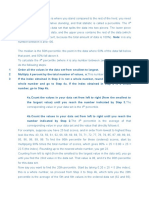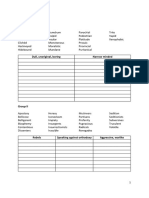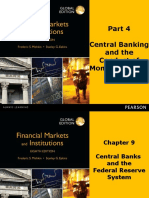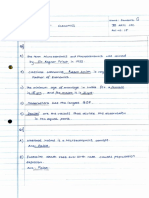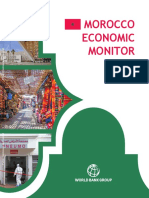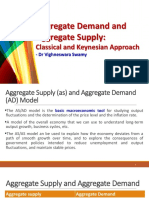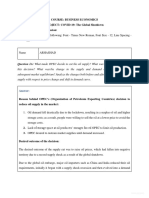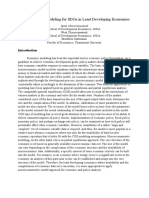Notes On Currency Convertibility
Notes On Currency Convertibility
Uploaded by
Bitan BanerjeeCopyright:
Available Formats
Notes On Currency Convertibility
Notes On Currency Convertibility
Uploaded by
Bitan BanerjeeOriginal Description:
Original Title
Copyright
Available Formats
Share this document
Did you find this document useful?
Is this content inappropriate?
Copyright:
Available Formats
Notes On Currency Convertibility
Notes On Currency Convertibility
Uploaded by
Bitan BanerjeeCopyright:
Available Formats
Notes on Currency Convertibility
Due to government restrictions, a significant number of currencies are not freely convertible into other
currencies. A country's currency is said to be freely convertible when the country's government
allows both residents and non-residents to purchase unlimited amounts of a foreign currency with it.
A currency is said to be externally convertible when only non-residents may convert it into a foreign
currency without any limitations. A currency is nonconvertible when neither residents nor non-
residents are allowed to convert it into a foreign currency.
Free convertibility is the exception rather than the rule. Many countries place some restrictions on
their residents' ability to convert the domestic currency into a foreign currency (a policy of external
convertibility). Restrictions range from the relatively minor (such as restricting the amount of foreign
currency they may take with them out of the country on trips) to the major (such as restricting
domestic businesses' ability to take foreign currency out of the country). External convertibility
restrictions can limit domestic companies' ability to invest abroad, but they present few problems for
foreign companies wishing to do business in that country. For example, even if the Japanese
government tightly controlled the ability of its residents to convert the yen into US dollars, all US
businesses with deposits in Japanese banks may at any time convert all their yen into dollars and take
them out of the country. Thus, a US company with a subsidiary in Japan is assured that it will be able
to convert the profits from its Japanese operation into dollars and take them out of the country.
Advantages
Encourages export: - Exporters are motivated to increase their exports since there is possibility of making
more profits under currency convertibility conditions. As a result of convertibility on current account,
higher profits will be earned since market exchange rate will give higher returns as compared to the
officially fixed exchange rate. From the given exports, they earn more foreign exchange.
Encourage Import Substitution: - since the market determined exchange rate is higher than the officially
fixed exchange rate, imports become more expensive. This makes countries to go in for import
substitution.
Incentives to Send Remittances from Abroad:- Indian workers employed abroad & NRIs find it
convenient to send remittances of foreign exchange without hassle. This also encouraged illegal
remittances like hawala money & smuggling.
Countries are Enabled to specialize in the Production of Goods for which they have a Comparative
Advantage:- each country will be able to engage in the production of goods in accordance with their
comparative advantage & resource endowments. When there is currency convertibility, market exchange
rate truly reflects the purchasing power of their currencies which is based on the prices & costs of goods
in different countries. In a competitive environment, lower prices of goods which reflect the comparative
advantage will enable countries to increase exports. Thus currency convertibility will lead to
specialization & international trade on the basis of comparative advantage. This will be beneficial for all
countries in trade.
Integration of World Economy:- currency convertibility enables better integration of the world economy.
The easy availability of foreign exchange helps in the growth of trade & increased capital flows between
countries. This will enables the growth of all countries which is important in the context of globalization.
Disadvantages
Currency convertibility can give rise to problems of inflation in domestic economy. The market
determined exchange rate is generally higher than the officially fixed exchange rate. This leads to a rise
in prices of essential imports which can results in a situation of cost push inflation in an economy.
Under capital account convertibility, a country is given the freedom to transact in financial assets with
foreign countries without restrictions. Such an arrangement is to enable increased investment activities.
But there are risks attached to it. A very likely possibility is that of capital flight at the first sign of an
internal economic problem.
Speculative activities may increase under free convertibility, making the exchange rates highly volatile.
Speculation can lead to depreciation of currencies & flight of capital. This is proved by the experience of
the South East Asian countries like Thailand, Malaysia, in the year 1997-199, which experienced severe
depreciation of currency & capital flight.
Counter-trade Example
In 2000, India and Iraq agreed on an "oil for wheat and rice" barter deal, subject to United
Nations approval under Article 50 of the UN Persian Gulf War sanctions, that would facilitate 300,000
barrels of oil delivered daily to India at a price of $6.85 a barrel while Iraq oil sales into Asia were
valued at about $22 a barrel.
You might also like
- Fundamentals of International FinanceDocument11 pagesFundamentals of International FinanceChirag KotianNo ratings yet
- Coercion and Military Strategy: Why Denial Works and Punishment Doesn'tDocument53 pagesCoercion and Military Strategy: Why Denial Works and Punishment Doesn'tBitan BanerjeeNo ratings yet
- 1) Introduction: Currency ConvertibilityDocument34 pages1) Introduction: Currency ConvertibilityZeenat AnsariNo ratings yet
- Liquid Stores of Value International Trade Currencies: Currency ConvertibilityDocument35 pagesLiquid Stores of Value International Trade Currencies: Currency ConvertibilityGaurav SinghNo ratings yet
- Liquid Stores of Value International Trade Currencies: Currency ConvertibilityDocument34 pagesLiquid Stores of Value International Trade Currencies: Currency ConvertibilityVip's SakariyaNo ratings yet
- Tema 5. Introduction To The Gold StandardDocument9 pagesTema 5. Introduction To The Gold Standardot2023juantinNo ratings yet
- Q1) Factors Affecting Exchange Rates: Interest and Inflation RatesDocument7 pagesQ1) Factors Affecting Exchange Rates: Interest and Inflation RatesMandar SangleNo ratings yet
- FEMADocument5 pagesFEMAKarmveer KushwahNo ratings yet
- International Monetary and Financial Systems - Chapter-4 MbsDocument62 pagesInternational Monetary and Financial Systems - Chapter-4 MbsArjun Mishra100% (1)
- IFM, Unit-IV - Lecture NoteDocument27 pagesIFM, Unit-IV - Lecture Noteprasadanshu9666No ratings yet
- International FinanceDocument9 pagesInternational Finance05 Trần Nguyên BìnhNo ratings yet
- Foreign Exchange and Foreign Exchange MarketDocument28 pagesForeign Exchange and Foreign Exchange MarketKubalyenda SilajiNo ratings yet
- Foreign Exchange Market: Presented by Geetha Gowthami.V Naveen.Y Vinod.MDocument17 pagesForeign Exchange Market: Presented by Geetha Gowthami.V Naveen.Y Vinod.MVinodkumar MoolaNo ratings yet
- Global Financial System: International InstitutionsDocument21 pagesGlobal Financial System: International Institutionsapi-265248190% (1)
- Capital Account Convertibility (ECO)Document40 pagesCapital Account Convertibility (ECO)KhushbooNo ratings yet
- Exam Assigment of IFMDocument9 pagesExam Assigment of IFMPunita KumariNo ratings yet
- Chapter 4 The Interntional Flow of Funds and Exchange RatesDocument14 pagesChapter 4 The Interntional Flow of Funds and Exchange RatesRAY NICOLE MALINGI100% (1)
- The Impact of Currency Fluctuations. Article in Express Money11092019Document2 pagesThe Impact of Currency Fluctuations. Article in Express Money11092019shrikantNo ratings yet
- Currency Convertibili TY - Pros & Cons & 1997 ASIAN CrisisDocument22 pagesCurrency Convertibili TY - Pros & Cons & 1997 ASIAN Crisisrajan1204No ratings yet
- 7.5 Institutional Frameworks That Facilitate TradeDocument3 pages7.5 Institutional Frameworks That Facilitate TradeMikaela JeanNo ratings yet
- International TheaDocument4 pagesInternational TheaJhon Lloyd QuintanaNo ratings yet
- International FinanceDocument15 pagesInternational FinanceManuel Andres OrtizNo ratings yet
- Econ 323-Open MacroeconomyDocument14 pagesEcon 323-Open Macroeconomyezekielmuriithi34No ratings yet
- Quiz AnswerDocument11 pagesQuiz Answercharlie tunaNo ratings yet
- The Balance of PaymentsDocument5 pagesThe Balance of PaymentsNg Lily Kho100% (1)
- Determinants of Exchange RateDocument2 pagesDeterminants of Exchange RateSajid Ali BhuttaNo ratings yet
- Chapter 7 SummaryDocument3 pagesChapter 7 Summaryhope38530No ratings yet
- Economics ProjectDocument27 pagesEconomics ProjectKashish AgrawalNo ratings yet
- BS BBA Inter Business Forex PPT 4Document34 pagesBS BBA Inter Business Forex PPT 4sbjafri0No ratings yet
- ForeignDocument70 pagesForeignadsfdgfhgjhkNo ratings yet
- Eco AbhishekDocument16 pagesEco AbhishekJasmine KaurNo ratings yet
- Ass1 InternationalDocument21 pagesAss1 InternationalAbdulhafiz HajkedirNo ratings yet
- Module 2 PDFDocument29 pagesModule 2 PDFRAJASAHEB DUTTANo ratings yet
- Bhasme NotesDocument13 pagesBhasme NotesRutvik DicholkarNo ratings yet
- Unit 2 Foreign Exchange and Balance of Payments Foreign Exchange Market Meaning & Definition of Foreign ExchangeDocument26 pagesUnit 2 Foreign Exchange and Balance of Payments Foreign Exchange Market Meaning & Definition of Foreign ExchangeKaran C VNo ratings yet
- 1.what Is An Exchange RateDocument15 pages1.what Is An Exchange RateCristina TobingNo ratings yet
- Monetory Eco Assignment and PPTDocument8 pagesMonetory Eco Assignment and PPTobayed florianNo ratings yet
- Chap 2 International-FinanceDocument30 pagesChap 2 International-FinanceLyca RioNo ratings yet
- Lecture Notes International Finance PrintedDocument47 pagesLecture Notes International Finance PrintedPurnima PuriNo ratings yet
- International Trade - An OverviewDocument22 pagesInternational Trade - An OverviewmeepfantasyNo ratings yet
- Lecture Note 2 On IcfDocument11 pagesLecture Note 2 On IcfdemolaojaomoNo ratings yet
- International Business Assignment: BY: Neetika Jalan 08D1678 Bba "B"Document17 pagesInternational Business Assignment: BY: Neetika Jalan 08D1678 Bba "B"jayesh611100% (1)
- International Trade of Goods and Services And: Key Factors That Affect Foreign Exchange Rates 1. Inflation RatesDocument5 pagesInternational Trade of Goods and Services And: Key Factors That Affect Foreign Exchange Rates 1. Inflation RatesUtkarsh GuptaNo ratings yet
- Group 5 International EconomicsDocument28 pagesGroup 5 International Economicsauhsoj raluigaNo ratings yet
- Quizz Jbyap DBADocument3 pagesQuizz Jbyap DBAJOHN BEBON YAPNo ratings yet
- Foreign Exchange RateDocument4 pagesForeign Exchange RateDivya ChaudharyNo ratings yet
- 01 Global Financial System: 1.1 International InstitutionsDocument25 pages01 Global Financial System: 1.1 International Institutionsapi-26524819No ratings yet
- International Financial Management Unit - IDocument15 pagesInternational Financial Management Unit - IBHRAMARBAR SAHANINo ratings yet
- Chapter 4Document24 pagesChapter 4Manjunath BVNo ratings yet
- AP Macroeconomics Introducing Macroeconomics Focus Sheets: Unit 7, International EconomicsDocument3 pagesAP Macroeconomics Introducing Macroeconomics Focus Sheets: Unit 7, International EconomicsHansamita MajeeNo ratings yet
- Global Financial System: International InstitutionsDocument15 pagesGlobal Financial System: International Institutionsapi-26524819No ratings yet
- Exchange Rate Determinants AND Fixed & Flexible Exchange RatesDocument27 pagesExchange Rate Determinants AND Fixed & Flexible Exchange RatesArunav BarooahNo ratings yet
- Exchange RateDocument10 pagesExchange RateSteeeeeeeephNo ratings yet
- Exchange RateDocument10 pagesExchange RateSteeeeeeeephNo ratings yet
- College of Business and Economics: Econ. 2082: International Economics II, AssignmentDocument11 pagesCollege of Business and Economics: Econ. 2082: International Economics II, AssignmentAbdulhafiz HajkedirNo ratings yet
- Gold Prices and Foreign Exchange ReservesDocument10 pagesGold Prices and Foreign Exchange ReservesPriyanka MalikNo ratings yet
- Foreign Exchange Controls Are Various Forms ofDocument5 pagesForeign Exchange Controls Are Various Forms ofmundrahnNo ratings yet
- Currency Fluctuations - How They Effect The Economy - InvestopediaDocument5 pagesCurrency Fluctuations - How They Effect The Economy - InvestopediaYagya RajawatNo ratings yet
- Foreign Exchange RateDocument4 pagesForeign Exchange RateBeautyfull Naina Mehta0% (1)
- Mid-Term Exam-International Financial ManagementDocument6 pagesMid-Term Exam-International Financial ManagementFIRDA SULAININo ratings yet
- Responsibility To ProtectDocument16 pagesResponsibility To ProtectBitan BanerjeeNo ratings yet
- Section II - Quantitative Reasoning 37 Questions 75 MinutesDocument6 pagesSection II - Quantitative Reasoning 37 Questions 75 MinutesBitan BanerjeeNo ratings yet
- IELTS Speaking Topic - Part 1Document9 pagesIELTS Speaking Topic - Part 1Bitan Banerjee100% (1)
- IELTS General Training - Reading Comprehension Passage I: Questions 1-6Document14 pagesIELTS General Training - Reading Comprehension Passage I: Questions 1-6Bitan BanerjeeNo ratings yet
- Practice Test 25 Questions Time: 10.45am To 11.30am: Rituparna Poria Date: 07.05.2016Document7 pagesPractice Test 25 Questions Time: 10.45am To 11.30am: Rituparna Poria Date: 07.05.2016Bitan BanerjeeNo ratings yet
- Ielts y N NG PracticeDocument4 pagesIelts y N NG PracticeBitan BanerjeeNo ratings yet
- IELTS Listening ComprehensionDocument8 pagesIELTS Listening ComprehensionBitan BanerjeeNo ratings yet
- Technology/Science/Research & Development/Study: Government/NationDocument5 pagesTechnology/Science/Research & Development/Study: Government/NationBitan BanerjeeNo ratings yet
- Listening AnswersDocument1 pageListening AnswersBitan BanerjeeNo ratings yet
- Some Imminent Tech Conferences in India in March 2018Document2 pagesSome Imminent Tech Conferences in India in March 2018Bitan BanerjeeNo ratings yet
- Ielts Academic ReadingDocument16 pagesIelts Academic ReadingBitan BanerjeeNo ratings yet
- Practice Test 25 Questions Time: 10.45am To 11.30am: Sabahat Ambreen Date: 07.05.2016Document7 pagesPractice Test 25 Questions Time: 10.45am To 11.30am: Sabahat Ambreen Date: 07.05.2016Bitan BanerjeeNo ratings yet
- GRE Mixed QuestionsDocument41 pagesGRE Mixed QuestionsBitan BanerjeeNo ratings yet
- Practice Test 25 Questions Time: 10.45am To 11.30am: Sritoma Bose Date: 07.05.2016Document7 pagesPractice Test 25 Questions Time: 10.45am To 11.30am: Sritoma Bose Date: 07.05.2016Bitan BanerjeeNo ratings yet
- Practice Test 25 Questions Time: 10.45am To 11.30am: Swati Arora Date: 07.05.2016Document6 pagesPractice Test 25 Questions Time: 10.45am To 11.30am: Swati Arora Date: 07.05.2016Bitan BanerjeeNo ratings yet
- Answers and Explanation To RC Set IDocument10 pagesAnswers and Explanation To RC Set IBitan BanerjeeNo ratings yet
- Practice Test 25 Questions Time: 10.45am To 11.30am: Archisman Dhar Date: 07.05.2016Document7 pagesPractice Test 25 Questions Time: 10.45am To 11.30am: Archisman Dhar Date: 07.05.2016Bitan BanerjeeNo ratings yet
- GRE Verbal Reasoning TestDocument6 pagesGRE Verbal Reasoning TestBitan Banerjee14% (7)
- Special Reading Comprehension Set 1Document4 pagesSpecial Reading Comprehension Set 1Bitan BanerjeeNo ratings yet
- Verbal Ability Test GREDocument6 pagesVerbal Ability Test GREBitan BanerjeeNo ratings yet
- Verbal Reasoning GREDocument7 pagesVerbal Reasoning GREBitan Banerjee33% (3)
- Percentile Is A Value in A Data Set That Splits The Data Into Two Pieces: The Lower PieceDocument3 pagesPercentile Is A Value in A Data Set That Splits The Data Into Two Pieces: The Lower PieceBitan BanerjeeNo ratings yet
- Text Completion ExerciseDocument4 pagesText Completion ExerciseBitan BanerjeeNo ratings yet
- Word Family Set 1Document3 pagesWord Family Set 1Bitan BanerjeeNo ratings yet
- Word Family PracticeDocument4 pagesWord Family PracticeBitan BanerjeeNo ratings yet
- Group 3 Arid Banal Debauched Hackneyed Iniquitous Licentious Prodigal Profligate Promiscuous Prosaic Prosy Squandering Stodgy Trite Wanton WorkadayDocument2 pagesGroup 3 Arid Banal Debauched Hackneyed Iniquitous Licentious Prodigal Profligate Promiscuous Prosaic Prosy Squandering Stodgy Trite Wanton WorkadayBitan BanerjeeNo ratings yet
- CJR Bahasa Inggris BisnisDocument14 pagesCJR Bahasa Inggris Bisnisrasvina mastariNo ratings yet
- Econ Notes From 25Document5 pagesEcon Notes From 25Ayisa YaoNo ratings yet
- Chapter 24Document43 pagesChapter 24sbjafri0No ratings yet
- Wesp 2024 WebDocument196 pagesWesp 2024 WebMaria SilvaNo ratings yet
- Cima Ba1 2020Document138 pagesCima Ba1 2020Clint NarsiNo ratings yet
- Central Banking and The Conduct of Monetary PolicyDocument55 pagesCentral Banking and The Conduct of Monetary PolicyDaveli NatanaelNo ratings yet
- Central Banking and Moneytary PolicyDocument16 pagesCentral Banking and Moneytary PolicyNahidul Islam IUNo ratings yet
- Big PushDocument4 pagesBig PushJUDE VINCENT MACALOSNo ratings yet
- Passing The BuckDocument42 pagesPassing The BuckSantiago100% (1)
- Economics Term PaperDocument9 pagesEconomics Term Papersameera gupteNo ratings yet
- Cambridge Pre-U Teacher Guide Business and ManagementDocument77 pagesCambridge Pre-U Teacher Guide Business and ManagementiisjafferNo ratings yet
- Eco Paper 2023Document12 pagesEco Paper 2023rizabahrixxNo ratings yet
- ECON 203 Midterm 2013W FaisalRabbyDocument7 pagesECON 203 Midterm 2013W FaisalRabbyexamkillerNo ratings yet
- Morocco Economic MonitorDocument44 pagesMorocco Economic MonitorReddahi BrahimNo ratings yet
- Introduction To Managerial Economics: Module-I PART - TIME - Jan 2012Document27 pagesIntroduction To Managerial Economics: Module-I PART - TIME - Jan 2012alpamehtaNo ratings yet
- Chapter 8Document7 pagesChapter 8Andi AmirudinNo ratings yet
- ECON 545 Business Economics Week 8 Final Exam All Sets A+ Complete AnswerDocument13 pagesECON 545 Business Economics Week 8 Final Exam All Sets A+ Complete AnswerKathy Chugg0% (1)
- Gold StandardDocument21 pagesGold StandardIhsan Ullah HimmatNo ratings yet
- 6-7. Aggregate Demand and SupplyDocument37 pages6-7. Aggregate Demand and SupplyLakshmi NairNo ratings yet
- Question 1A: What Made OPEC Decide To Cut The Oil Supply? What Was The Desired Outcome ofDocument8 pagesQuestion 1A: What Made OPEC Decide To Cut The Oil Supply? What Was The Desired Outcome ofSonu KumarNo ratings yet
- Macroeconomic Modeling For SDGs in LeastDocument25 pagesMacroeconomic Modeling For SDGs in LeastAM operationNo ratings yet
- Project 1 Teaching and Learning StrategiesDocument27 pagesProject 1 Teaching and Learning StrategiesOyindamola OladokeNo ratings yet
- KTVM On TapDocument27 pagesKTVM On Tapnguyenath1705No ratings yet
- Pump PrimingDocument3 pagesPump PrimingTrúc NgôNo ratings yet
- Macroeconomics Review QuestionsDocument7 pagesMacroeconomics Review QuestionsIan100% (1)
- Part 1: The International Financial Environment Chapter 4 Exchange Rate DeterminationDocument32 pagesPart 1: The International Financial Environment Chapter 4 Exchange Rate DeterminationAbdelrahman HassanNo ratings yet
- Unconventional Policies and Their Effects On Financial Markets PDFDocument36 pagesUnconventional Policies and Their Effects On Financial Markets PDFSoberLookNo ratings yet
- Stiglitz The Non-Existent HandDocument9 pagesStiglitz The Non-Existent HandAndreea MitrofanNo ratings yet
- Presentations 2024Document4 pagesPresentations 2024carlaNo ratings yet
- Macroeconomics-CPI: - Consumer Price IndexDocument29 pagesMacroeconomics-CPI: - Consumer Price IndexKartik KhareNo ratings yet


